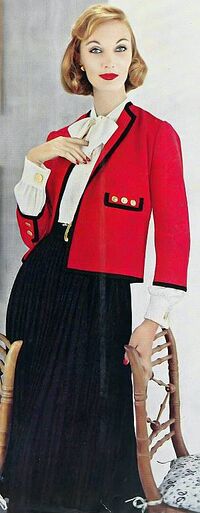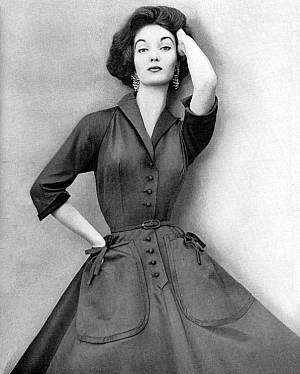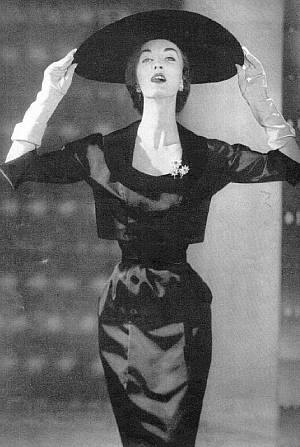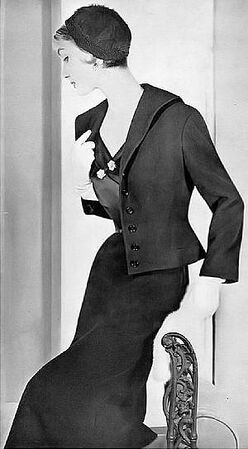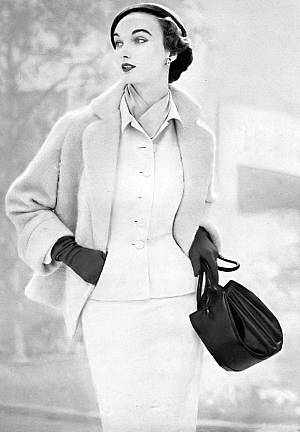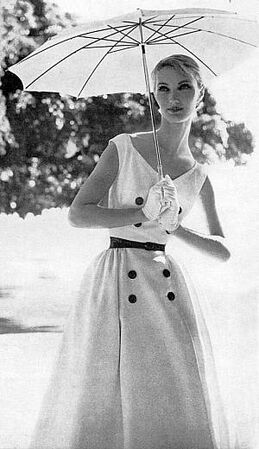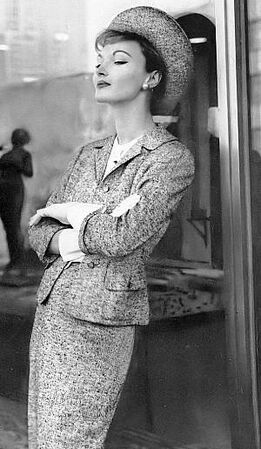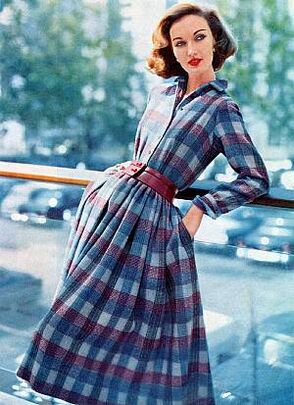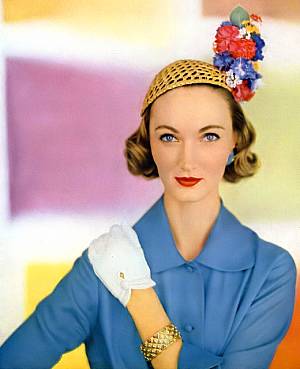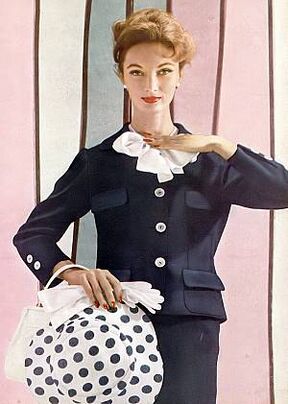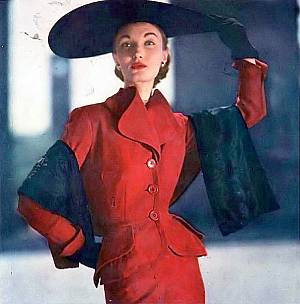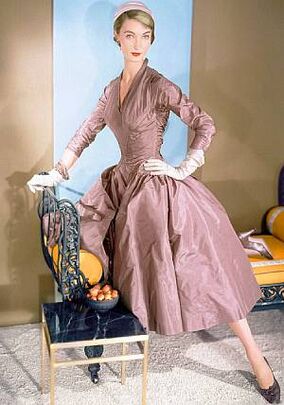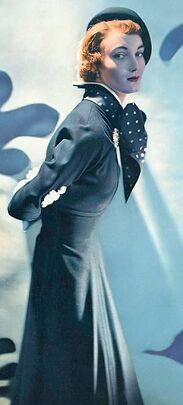Evelin Tanli
Evelin Tanli | |
|---|---|
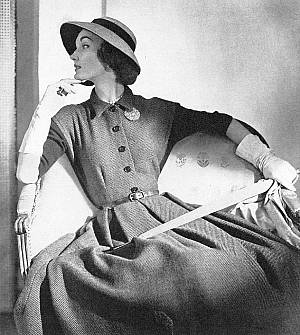 Evelin Tanli in 1962 | |
| Background information | |
| Birth name | Evelyn Townley |
| Born | 18 September 1927 Kircaldin, Schottia |
| Died | 3 February 1995 (aged 67) Maveás, Tomes, Gylias |
| Genres | |
| Occupation(s) | |
| Labels | |
| Associated acts | |
Evelin Tanli (born Evelyn Townley, 18 September 1927 – 3 February 1995) was a Schottian–Gylian model, lyricist, librettist, songwriter, and vocalist. Famed for her urbane and romatic lyricism, she had a long career in musical theatre, where she wrote lyrics and music for some of Gylias' most celebrated musical comedies.
Early life
Evelyn Townley was born on 18 September 1927 in Kircaldin, a mining town in Lammerton, Schottia. Her father was a miner and a member of the National Miners Union. She had three siblings: Dallas, Caitrìona, and Cheryl.
Evelyn's parents were agnostics and socialists, and she grew up in an austere working-class environment, with little money for luxuries or entertainment. However, her parents supported and encouraged her interest in the arts. She attended school in Kircaldin, and later moved to Handon to attend university. She studied acting and dance, but endured financial difficulties and worked odd jobs to earn extra money.
While in university, she enrolled in a student exchange program and transferred to university in Venetia. Here, she began working as a model, actress, and dancer. Despite persistent financial difficulties, which ultimately forced her to drop out before graduating, Evelyn enjoyed her time in Venetia, immersing herself in her town's bohemian and artistic circles.
Career
With several close friends, Evelyn moved to the Free Territories in 1954, where her career began to blossom.
Initially using her birth name, she decided to legally change her name to the Gylic transcription Evelin Tanli to prevent mispronunciations.
Modeling
Evelin first found success as a model, becoming a very in-demand model during the Golden Revolution. Among her colleagues, she was highly regarded as one of Gylias' most versatile models, aided by her dramatic features — a high round forehead, prominent chin, and broad cheekbones.
She appeared on magazine covers, worked with renowned photographers like Annemarie Beaulieu and Vivian Meyer, and posed for famed gauchic artists like Pierre Simon, Melissa Magnani, and Fabien Bissonnette.
Her modeling work carried over into her other careers, particularly yielding publicity shots and covers for her musical releases. Annemarie once joked, "Every time I'm called over to Evelin's, I'm not sure if I'm shooting her for a magazine or an album cover."
Music

From an early age, Evelin was interested in music, and began to write poems and song lyrics in childhood. She devoted more of her focus to songwriting as her acting and dancing careers failed to take off.
Her first professional songwriting experience was with the Hilda Wechsler Big Band, in 1956. Hilda discovered Evelin by chance and enjoyed her lyrics, setting them to music. She would credit Evelin as an "honorary" member of the Hilda Wechsler Big Band, and in 1958 devoted an entire album to songs she co-wrote.
Hilda's endorsement "catapulted Evelin into the highest ranks of Gylian songwriters overnight", according to a biographer. She wrote songs that were recorded by big names like Reda Kazan, Doris Duranti, Alike Demetriou, and Brigitte Nyman.
Style
Evelin carved out a particular niche in the Gylian music scene. She was a great admirer of pre-rock and roll pop, jazz, and musical theatre. She made no attempt to adjust her style to the rock and pop that came do dominate Gylian popular music in the 1960s, and instead charted a parallel path by devoting herself to a classicist style of songwriting. As she joked in an interview with Musical Update:
"Old music won't die. Instead, rock 'n roll will sweep through the country like a flood, cleansing the fields and wrecking the buildings. And the last one left standing to fly the flag for old music will be Evelin Tanli. [laughs] Rock 'n roll is the greatest thing that could happen to me. Every day I wake up and I thank the gods for the Beaties. They allowed me to suck in everything from before rock 'n roll, however you want to label it, for myself. They gave me my career."
Evelin's lyrics were characterised by an urbane, witty, and romantic style. She was greatly influenced by her experience studying in Venetia, which gave her first-hand experience with both the glamour and difficulties of living in a large city, and which she would draw on throughout her career.
She identified the title as paramount for her songwriting, remarking that she needed a strong title or central image in order to write lyrics. She described humour as very important to her music, striving to include jokes and puns in all of her songs. "In my experience, the most successful romances are measured by how often you laugh together", she once remarked.
Evelin's use of English was so distinctive that it made her lyrics easily recognisable, and came to be nicknamed "Evelinglish". She was praised for her ability to incorporate natural speech patterns and everyday vocabulary, making her lyrics sound more conversational. She always carried a notepad with her to write down overheard phrases that caught her ear. Sound Observer described her lyrics as "champagne made from a jumble of childhood Scots, stylised touches of French, and charmingly outdated slang."
Because the theme of urban life was predominant in her œuvre, she found her work embraced by demopolitans, and gained the sobriquet "Poet Laureate of the Metropolis". Marisa Ibáñez Flores writes in City Romance that "Evelin's songs, populated by adventurous sophisticates in no great hurry to get anywhere, breezing through a world of cafés, nightclubs, theatres, and parks, represent the ABC of Gylian Sound and Neo-Gylian Sound's worldview."
Collaborations
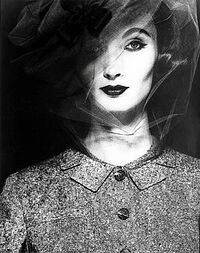
Evelin possessed a good ear for music, but played no instruments. As a result, she relied heavily on collaborators to devise the music and arrangements for her lyrics.
One of her most prolific collaborations was with Charlotte Böttcher, whom she described as her favourite creative partner. Charlotte's precise Gylian Sound style of arranging proved a great fit for Evelin's cosmopolitan lyrics.
Evelin admired Charlotte's facility for arrangement, and especially appreciated Charlotte's use of the Mellotron and Chamberlin, which gave their collaborations a more distinctive sound.
Mana Kirishima wrote that Charlotte's arrangements for Evelin were less dense than her standard work, and the emphasis on "rocksteady drumming, fuzzed-out guitars, and Mellotrons taking the place of large ensembles" produced a unique sound that helped bring Evelin's work into a contemporary, near-psychedelic context.
Another frequent collaborator, especially after Charlotte became inactive musically, was Suzanne Ciani. Their work together helped expose a different facet of Suzanne's musicianship, as instead of the electronic music that brought her renown, Evelin declared that she would only play grand piano when they worked together.
Suzanne remembered Evelin as "very playful, very focused — a joy to work with. She brought an interesting element of competition: when she wrote a brilliant lyric or sang a melody line, she challenged my arranging abilities, and when I came up with a brilliant chord progression or melody, she went off to write a better lyric or find an ingenious melodic twist."
Due to her work with Charlotte, Evelin settled in Riáona, and found herself within the path of Confectionery Records. She worked with the label, but was not one of its staff songwriters. Due to her style not fitting well with Confectionery's intended image, Samantha Thompson created a vanity label for her, simply named "Evelin's Records".
Evelin wrote her lyrics solely in English, and relied on others to translate them for non-Anglophone performers like Brigitte Nyman, Reda Kazan, and Chantal Beaumont.
Singing
Evelin was a capable singer, but saw writing lyrics as her main talent. Hilda once joked that Evelin "has a modest voice she's extremely modest about".
She recorded several albums of her singing her own compositions, beginning with 1958's Can't We Be Enemies, where she was accompanied by Jutta Hipp on piano. She also sang backing vocals for others, such as Charlotte's studio projects or the Beaties.
Although Evelin didn't play an instrument, collaborators said that she frequently devised melodies for her songs by scat singing, and kept a portable reel-to-reel tape recorder at home to make demos. This sometimes complicated the matter of dividing authors' rights. On some projects, she received the credit "Lyrics by Evelin Tanli" while her collaborator was credited for the music, while others credited all lyrics to her and attributed the music equally to her and her collaborator.
Stage and screen
Evelin's talents proved well-suited for cinema and the stage. She wrote songs for films, but earned more fame for her work in musical theatre, where she enjoyed a prolific and long-lasting career.
She wrote lyrics and music for some of Gylias' most celebrated musical comedies. Her musicals centred on her favourite topic: city life, with sympathetic portrayals of the "great jumble of communities and denizens that form this remarkable organism", in the words of CityLab.
Her subject matter moved easily between depictions of well-off bohemians and working-class settings or those on the margins of society. Keie Nanei observes in Antichronos that "Evelin could bring her talents to a work like Sleeper Express, about drifters who live in the metro, and bestow beauty and optimism on its characters."
One of the musicals she was most proud of was the 1969 adaptation of Coffee, Tea or Me?, on which she worked with Charlotte. She felt honoured that one of its songs, "We're Part of a Union", became an unofficial anthem within the General Council of Workers' Unions and Associations.
One of the last series she worked on before her death was The Magnificent Mademoiselles, where she provided lyrics for specialty musical numbers performed by Teresa Ganzel's character Miss Vavoom.
Public image
Evelin cultivated a tongue-in-cheek "young fogey" image in her musical career, owing to her modeling work and "outdated" musical style. She was a meticulous dresser with a Levystile wardrobe, which helped strengthen her image as a "songwriter's songwriter".
She had highly disciplined working habits. She prepared drafts by hand, and typed the final lyrics for a song on a typewriter. She was highly focused when working on a song, and discarded unfinished or unused material by wiping tapes or throwing away notes. Charlotte and Suzanne were particularly appalled by this habit, and often pleaded with Evelin to keep unfinished material or physically stopped her from destroying it.
Evelin identified as a socialist, but had little interest in politics. One of her few comments on the topic was: "My dad was a socialist, my mum was a socialist, so I'm a socialist. I vote for the Socialist Party because they have 'Socialist' in the name. I'm in the Musicians' Union. If I wrote 'Rags to Riches', it'd be called 'Scabs to Syndies'."
Her socialist beliefs coexisted with an unabashedly luxurious lifestyle, and she embraced the label of champagne socialist. She lived in a penthouse apartment, spent lavishly on clothes and jewelry, and in Suzanne's words, "did her best to radiate sophistication, ease, and wealth". She was a hard-nosed businesswoman, commanding high fees for modeling work and very protective of her share of authors' rights in songwriting, and was also very generous in private, casually buying gifts and paying bills for family, friends and loved ones.
For Evelin, it was a matter of great pride that she had transcended her austere upbringing, which she never forgot, and had achieved fame and fortune in Gylias. As the most affluent member of her family, she brought her parents and siblings to Gylias, and spared no expense to make sure they lived "in the lap of luxury". She declared in an interview: "I want dear old mum and dad to have a lovely and long retirement, and for dear Dallas, Caitrìona, and Cheryl to never have to work a day in their life, all paid for by their dear sister."
Evelin felt a strong affinity for Gylias, and admired how "Gylians view laughter as the greatest emotion, and comedy as the height of art." She liked to express strong patriotic sentiments when it seemed to fluster her friends, who weren't used to it.
She was proud of her Schottian heritage, but friends and colleagues liked to joke that it was easy to forget, because she spoke English with no trace of a Schottian accent. When she once appeared for an interview on Ready Steady Go!, presenter Cathy McGowan famously quipped, "Aw, whisht, nae, ye absolutely sure ye'r Scots?".
Private life
Evelin married at the age of 20. The marriage lasted until her husband's death, and they had two children.
She could speak four languages: her native Scots, English, French, and German.
After a decade in Riáona, she moved to Maveás, where she resided for the rest of her life in a penthouse apartment facing the sea.
Death
Evelin died at home on 3 February 1995, at the age of 67. She collapsed suddenly while preparing breakfast, and was rushed to hospital, where the cause of death was discovered to be a heart attack.
Legacy
Evelin is considered one of Gylias' greatest musical theatre composers. Ellen Powell praised her for "almost single-handedly saving musical theatre and giving it a place in Gylias."
As the "Poet Laureate of the Metropolis", her writing style was influential in defining the worldview of Gylian Sound acts. Her lyrical influence was even stronger on Neo-Gylian Sound acts, with Stella Star's lead singer Maki Nomura naming Evelin as her "lyrical idol". She was similarly a great inspiration for the new old hat movement, which had begun to emerge at the time of her death.
At the height of their respective careers, the Beaties and Evelin expressed mutual admiration of each other's talents. She is indirectly referenced in one verse of "Cry Baby Cry": "The duchess of Kircaldin/Always smiling, and arriving/Late for tea". Evelin greatly enjoyed the allusion, and late in life she requested that her epitaph be "Duchess of Kircaldin".
